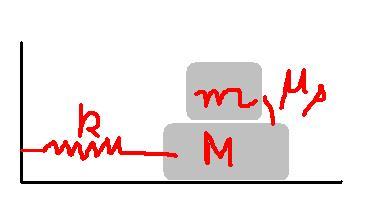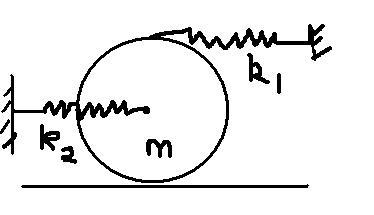Q2 now.......sir plz reply...
Q1 2 blocks are arranged as in figure.The coeff of friction b/w blocks is μs whereas no friction b/w floor and block.Calculate max possible amplitude for no slipping.
I am getting A=μsg(m+M)/k
Q2 A disc of mass m is connnecr=ted to 2 springs with constants k1 and k2.Find angular frequency for small oscillations.
I am getting ω=√(2k1/m) which i feel is wrong........
plzzzzz post ur answers............
-
UP 0 DOWN 0 0 21

21 Answers
try this by energy method
its much simpler
I don't want to go by force method tight now
If possible, I will try it later
Sir can u tell me where will be initial equilibium position??????????
I was attempting it by force method........
try question 2 by using conservation of energy and then differentiating
Eureka and sankara.........pls point out the mistake in my solution.
Q1)
Why (m+M)? I think m will be enough. Pl s corrrect me cos i know i am wrong
net force on system of 2 blocks is kA........
=> asys=kA/(m+M)
for no slipping, asys=asmaller block=kA/(m+M)
but Fnet(small block)=fmax=μsmg
=>A=μsg(m+M)/k............
is anything wrong here??????
Anyways, the amount by which u intially displace the masses by will be the amplitude right?
here come the differences...................already 3 diff answers........more will surely come...........I dont know which is correct.....
The restoring force shoould not overcome the frictional force b/w the two blocks and the directions of frictional and restoring forces are opposite.
So kx ≤ μsmg where x is initial displacement and hence the amplitude
=>x ≤ μsmg/k
Pls correct me if im wrong
I dont have the answers dear............thats why i want to confirm........lets see what others have to say..............can u post a brief soln so that i can get an idea what u have done....